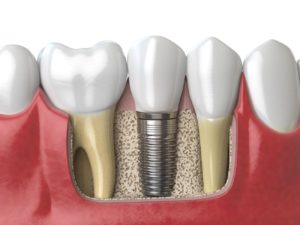If you have one or more missing teeth, you might notice dissatisfaction with the appearance of your smile or a decline in oral function. But tooth loss can put your smile at risk of further harm without intervention from your dentist. Your jaw could also face structural problems if you do not treat tooth loss.
Your dentist can preserve your smile and your jaw with dental implants. These fixed devices offer comprehensive restorative benefits compared to removable tooth replacement options. Read on to discover how missing teeth can affect your jaw health and how implant dentistry can help.

What Happens to the Jaw After Tooth Loss?
Healthy dental patients have teeth that extend into a root below the gumline that reaches the jaw. This tooth root stimulates the bone in the jaw, keeping it strong and stable. When you lose a tooth, the jaw stops receiving this stimulation.
In the absence of the tooth root, the bone in the jaw will then deteriorate. This will leave you with a sagging appearance in the face and with teeth that may shift out of place as the jaw changes. You cannot prevent this problem or restore your oral structure after this damage without help from your dentist.
How Do Dental Implants Protect the Jawbone?
Removable dentures and similar treatments will replace missing teeth above the gumline, but this will not address potential bone loss in the jaw. For this issue, dentists will recommend tooth replacement with dental implants. These fixtures feature a titanium post anchor that a dentist will surgically place into the jaw.
The anchor fuses with the jawbone to create an ideal support for prosthetic teeth. It serves as a substitute for the missing tooth root and will stimulate the jawbone once again.
The treatment will stop bone degeneration in the jaw, protecting its structure. Dental implants will remain in place, offering these restorative benefits, for twenty years or longer with proper care.
Will My Jaw Support a Dental Implant?
Though the advantages of implant dentistry seem clear, not every dental patient will qualify for this treatment. In order to successfully receive an implant, your jaw must retain enough healthy bone matter to sustain and fuse with the anchor of the implant. If too much bone has already been lost, you might not have a strong enough jaw to receive this treatment.
In this case, your dentist might suggest a bone graft, an oral surgery where a dentist will add bone material to the jaw to build structure. Once you heal, the jaw might be stable enough to support a dental implant. Otherwise, you will need an alternative tooth replacement solution.
Your dentist will evaluate your jawbone health to determine your eligibility for dental implants using x-ray imaging. Schedule a consult with your dentist to learn if this treatment is right for your unique smile. Call 972.449.5759 to learn more or contact your dentist’s office online.
